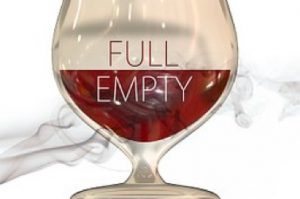Glass Half-Full or Half-Empty? You decide!

I’ve been on holiday (what do you mean “Thank God?”). I considered putting a few pictures on Facebook, but who wants to see a half-naked, rather white (with a few red patches) middle-aged man sitting in his Speedos reading Charles Dickens?
Anyway, we had a wonderful time, thank you. We were in Italy. The scenery was amazing, the people lovely, the sun shone virtually every day, the food was scrumptious and the hotel very comfortable.
On the day of our departure, we were stood in the hotel lobby awaiting our transfer coach with another couple, who had also stayed in our hotel for the same duration. Exchanging polite chitchat, I made the unfortunate mistake of asking them if they’d had a nice holiday. Sadly not. It appeared they had enjoyed very little. The roads were too busy, but using the trains was awful. There was a lot of noise, there were far too many tourists wandering round Sorrento, presumably not including them. The hotel was ‘so-so’ (what does that actually mean?) and they didn’t think much of Italy, full stop.
This delightful summary then segued into a Monty Python-type rant along the lines of ‘what has the EU ever done for us?’ Thankfully, the arrival of the coach prevented any further diatribe and I staggered onto the bus, feeling like I’d just done three rounds with Mike Tyson.
But, isn’t it incredible that two people can have virtually the same experience and yet look at something in an entirely different way? When I thought about it, the place was very busy, there was lots of hustle and bustle and, yes, a good number of tourists, but the words I thought of to describe the surroundings would be vibrant, lively, cosmopolitan, popular and ‘happening’. These words contrasted sharply with the words chosen by the other couple, who used far less flattering adjectives to describe their own experience.
We often refer to people as ‘glass half-full or half-empty’ types, optimists or pessimists, happy or miserable. And there is an implication therein, that people are either one or the other, as if they were born that way and cannot change their outlook.
Nothing could be further from the truth. The fact is that what we choose to focus on becomes our reality. We can focus on the positive or the negative; they are all around us in abundance. We often see that in sport. Two people can go along to one match and see an entirely different game, especially if they happen to be opposing supporters. One thinks the referee had a good game, the other, that he had a stinker! You see what you want to see.
One of the key ways in which we can choose our outlook is to be found in our vocabulary, the words we regularly use. It’s very easy to fall into using the same words, even if they don’t really apply.
Consider words or phrases you regularly hear nowadays: “Stressed-out”, ‘burnt-out”, “having a meltdown”, “going ape-s**t”. In the news everything seems to be a ‘crisis’ or a ‘disaster’, indeed, if you read the papers it would seem there is very little of a positive nature anywhere.
The fact is that the world we live in, the family we have, the work we do, is full of amazing people, fascinating subjects and exciting possibilities. Not everything works as well as it should, not everyone is always on top form and the best-laid plans don’t always turn out like we’d ideally like.
But how we view the world is always our choice. And by deliberately and consciously choosing to always focus on the ‘half-full’ aspects, we can do wonders, not just for our mood, but also for our health and success in life.
So, don’t be stressed, feel blessed. Don’t feel furious, get curious. Enjoy the ride and know that you’re in control. It’s your life, so enjoy. Is your glass half-full or half-empty? Actually, you can make it full to the brim…
Cheers!


